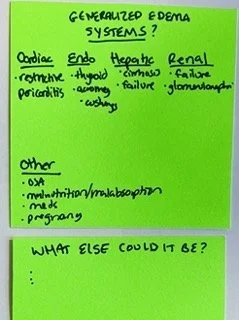Diagnostic Frameworks Part 2: Systems Framework
In a recent post I discussed the mechanism approach to formulating a differential diagnosis. Let’s dive into the systems framework to see how this can be used as another powerful tool in your diagnostic arsenal.
Case: A 36-year-old female presents to your clinic with a two-month history of pitting edema to her legs, arms, and even fingers. You ask yourself, what body systems can contribute to generalized edema?
An example of using the systems framework (*not an exhaustive list)
The systems framework generates differential diagnoses by considering the major systems of the human body and how they could contribute to the presenting complaint (e.g. integumentary, skeletal/muscular, nervous, endocrine, cardiovascular, lymphatic, respiratory/ENT, digestive, urinary, reproductive, hematological). This is when having foundational knowledge to apply to practice comes into play. If you have to look something up – do it! For generalized edema, you focus on the cardiac, endocrine, hepatic, and renal systems. I always like to include an “other” category for things that don’t quite fit major body systems. This also helps capture differentials I may otherwise have missed.
Back to the case: On further investigation, your patient has no past medical history and takes no medications. She denies chest pain, breathing difficulties, snoring, daytime sleepiness, or headaches. The first day of her last menstrual period was 2 days ago, and her BMI is 25. She does not take any medications. With a few questions you’re confident she is unlikely pregnant, she is not malnourished, and is not having acute cardiac or respiratory symptoms. Within the diagnostic framework you still want to rule out liver, renal, endocrine, and cardiac causes for generalized edema.
Key Take Home Point:
Some presenting complaints are amenable to diagnosis by considering which major organ systems can contribute to them. This helps organize your differential diagnoses and subsequent need for diagnostic testing.
Stay tuned for next week, where we will explore the anatomic and checklist frameworks.
Writing your ideas down can help organize your thinking!
References/Readings:
1. Check out this excellent podcast on diagnostic reasoning, https://imreasoning.com/
2. Approach to edema: https://www.aafp.org/pubs/afp/issues/2013/0715/p102.html

